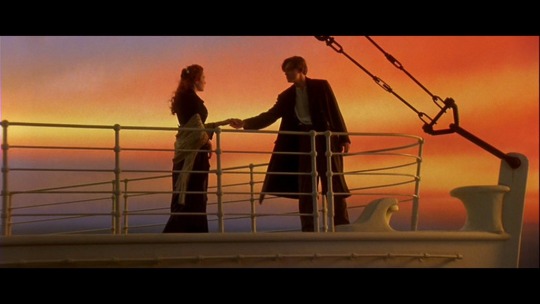#criminal behaviour but i support it in this case because i also dislike the painted backdrop
Text


It’s so funny that James Cameron changed what is arguably one of the most iconic shots in Titanic because he’s always hated it.
4 notes
·
View notes
Text
Right. So this is a response to @norbezdraws video, "Should We Fix Our Mad Geniuses?"
Norbez, you asked me for my thoughts on Twitter, so I'm gonna go post a novel of an explanation here, so get comfy in a nice reading chair. :)
If there's anyone else reading this, go listen to the video first, it's really interesting and it poses a rather fascinating question.
Also, sorry for the long wait for my response. ^^;
Also note: Everything I write here is about and from a storytelling and media perspective. Not real life.
I’m gonna use bullet points for my thoughts.
- On a moral level, the character should want to change. This is why Rick's capture in Rick and Morty and the protagonist in A Clockwork Orange (I haven't seen this film) are considered tragic. Because even though their capture will save people from getting hurt, they don't want to be captured or changed.
- I feel like drugs and other forms of addiction should be separated from mental illness, and that abuse should also be separated in the character examples list of flaws, because audience members' views on those different subjects could be contradictory.
For example:
Drugs/addiction is self-harming (a character flaw), so viewers may likely say, "Yes, the character should be fixed and have this removed."
Abuse (emotional/physical--and quite honestly, I think these two type should also be sub-separated; they're so different) harms other people who are around that character. This can make characters who have this type of flaw more villainous (Gothel from Disney's Tangled has been cited as an emotional abuser to her daughter) because if they don't want to change, then we as the audience see that as bad and/or irredeemable because they’re hurting people they care about and/or are close to.
Mental illness affects the character's mind. The mind is linked with personality. Therefore, if you "fix" the character by removing their mental illness, do you make the character no longer "them"? Who do they become?
Additionally, many works (such as Hellblade--which I haven’t played) frame the main character’s mental illness as not something to be cured. Rather, the story frames it as a part of the character. The challenges in the story come more from the outside world not understanding the main character’s different perception of the world.
Particularly with mental illness, opinions will vary depending on the viewer (as well as the individual character), as to whether the character should be "fixed."
Also, some examples, like Sherlock, make the addiction a flaw rather than a trait that is required for them to still be themselves/a genius. Sherlock would still be a genius without drugs. The drugs are his flaw[1], not his strength (intelligence). Take away Sherlock’s addiction and he’s still Sherlock. He’s still a detective.
*Footnote: In the BBC series and in original novels' canon, Sherlock supposedly only uses drugs when he has no case to solve. So drugs actually equals "Sherlock is not acting like a genius." BBC Sherlock actually wrecked this idea with the plot holes in season 4, but I'm going off tangent at this point (and at this point, a lot of BBC Sherlock fans--myself included--are currently not considering season 4 to even be series canon, given the amount of plot holes, out-of-character moments, and retcon-ing it contained. Seriously, what was up with that last episode?! THAT GUN DIDN’T LOOK ANYTHING LIKE A TRANQUILLISER! ARE YOU KIDDING M--).
- When I read the title of the video, I at first thought you meant "eccentricity": Characters who act outside social norms and don't follow the status quo/expectations (in an unharmful manner). Quirky characters. Characters who walk to the beat of a different drum. I understand that's not what you meant, but I might as well say my opinion on eccentric characters: It takes all sorts to make a world. They do not need to be "fixed."
- I also think misanthropic characters don't need to be fixed. I have to be clear on this, because SO many writers get misanthropia wrong: It's disliking humanity. Not wanting harm towards humanity. They just don’t want to want to deal with humanity. It's like being a hardcore grump/hermit rather than a jerk/murderer/rude person. A misanthropic person can have strong bonds with other humans, they just don't like dealing with strangers (often because they have been "burnt" before in past experiences) and can be very caring, selfless individuals with healthy relationships. Misanthropes are often the way they are because they care a lot, rather than a little (the latter being the stereotype I see a lot in fiction). Often, you can’t even tell if someone’s a misanthrope just by looking for them. A misanthrope looks at a smoker and thinks, "Why do THEY get dibs on the clean air?", etc. There is a difference between a grump and a jerk.
- I think series like Rick and Morty and BBC Sherlock have mad geniuses that treat their partner badly/questionably, yet we still like them as characters is less because of their “gifts,” and more because we see that when push comes to shove, Rick/Sherlock will act selflessly to protect Morty/John.
That’s how I interpret it anyway.
Rick is showing signs of being more caring (and hopefully less abusive) towards Morty. As Mycroft predicted, Sherlock is showing his heart more by being with John.
Their characters arcs are actually “fixing” them.
Another example of this type of relationship (or a similar type of relationship) is Eddy and her daughter Saffy’s relationship in Absolutely Fabulous. There’s an episode where Eddy protects her daughter from a guy who keeps bothering her (Saffy). Even though Eddy and Saffy constantly insult each other, at the end of the day, Eddy cares about her daughter. We don’t necessarily see their relationship as good, but we understand why they stay together.
And Eddy doesn’t even have “mad genius” nor traditionally heroic qualities. She’s the epitome of a “UK Comedy Series’ Unsympathetic Protagonist.”
Okay, now some character examples:
I'll start off with examples of abuse/addiction that are either BAD, start off as bad/questionable, or in a grey area:
These examples don't inherently make the works bad. I like all of the works listed below. These are just examples of problematic portrayals that we should pause for thought and reflect on.
- Bullet in the Face (a Canadian-American series about a criminal mastermind helping cops track down a bigger criminal mastermind) has Gunter attacking other characters to help solve cases. Gunter is portrayed as a villain protagonist, and most if not all of the characters he attacks are villains as well, making the protagonist ironically less problematic than if the writers portrayed him as a heroic character. The series basically says, “He’s a villain. So he does villainous things.”
- Dirk Gently: (We're talking BBC-2010-TV-series!Dirk, not the original books/other adaptations, nor the 2016 series.) Dirk is a detective who can solve mysteries others can't because of his odd philosophies. He has a partner, named Richard, who he hypnotises into giving him money, uses as a guinea pig (he injects him with a computer chip without warning him), and steals money from him. Yet Richard still stays with him (which is considered to be one of the biggest plot holes the adaptation has).
- Rick and Morty: Rick still continues to be abusive towards Morty, his own grandson. Rick's selfless act at the end of season 2 hints that Rick may slowly be trying to change his ways. Unity's note to Rick when it dumps him also implies that the writers are self-aware that Rick's abusive traits are a flaw, not a "kooky trait," so Rick could be interpreted as a "good" example too, because the series shows the negative effects of his behaviour.
- BBC Sherlock: As I said above.
Okay, now some examples (you asked for) of GOOD examples of abuse/addiction being portrayed in a non-romantic/kooky/positive/problematic light:
- Captain Haddock: In The Adventures of Tintin: The Crab with the Golden Claws album, Tintin meets an alcoholic who is the captain of a ship. Together, they escape the ship's crew and solve a mystery together. Haddock wouldn't really be considered an archetypal "mad genius," but by being with Tintin, his alcoholism decreases (though never actually disappears completely--writer Hergé liked to portray things realistically). His alcoholism decreases because of Tintin's support and friendship, which is really heartwarming to me.
- Dirk Gently: Here, we're talking book!Dirk. Irony, eh? In the original novels, Dirk is still abusive to his crime-solving partners (he, again, hypnotises Richard into jumping into the River Thames--which is not a nice place to go swimming, unless you like plastic bags and abandoned shopping trolleys). What makes the books different than the BBC series however, are the endings: Every partner Dirk gets, in each book, dumps him by the end of each adventure/novel they have with him because of his abusive tendencies. They don't want to be with him. That paints Dirk’s abuse as a more negative thing, instead of a “quirky” thing.
- Croak: The main character or this novel, Lex, is introduced as a teenage girl who recently developed anger management issues. She lashes out at people, especially at her school. It’s portrayed in an untraditionally human way: She describes it as feelings she knows are harmful, and she doesn’t enjoy these feelings of charged anger. She struggles to stop herself from lashing out. She also takes great care in making sure she doesn’t hurt her sister. (I haven’t finished the first book yet, so I don’t know how her character arc ends.)
- The Jennifer Ann Group’s yearly game jam focuses on creating games that educate people on teen dating abuse. The game Grace’s Diary is a notable example.
I hope this answered your questions on what my thoughts were on this subject.
3 notes
·
View notes